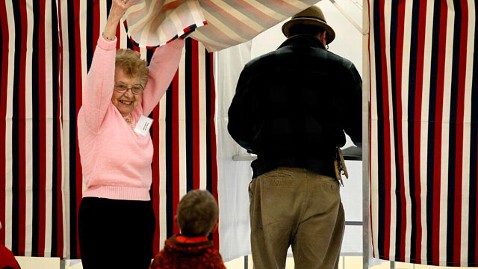2012: Women Will Be Key for Senate Democrats

Matt Rourke/AP Photo
2010 was not a great year for women in Congress. The midterm elections in that cycle saw the first decrease in female representation in Congress in 30 years.
In 2012, however, things could look much different for women.
At a news conference in Washington, D.C., in December, Sen. Patty Murray, D-Wash., the chairwoman of the Democratic Senatorial Campaign Committee declared that 2012 would be a "historic year" for women in the United States Senate.
On Thursday, Stephanie Schriock, the president of EMILY's List, a political action committee (PAC) that supports pro-choice, female Democratic candidates for office, echoed Murray's message.
"2012 is a historic year for EMILY's List," Schriock told reporters at a pen-and-pad briefing in Washington, D.C.
2012 already marks a historic year for women. There are seven female senators who are up for re-election in this cycle - the greatest number ever in the Senate. Six of those senators are Democrats, while one - Olympia Snowe of Maine - is a Republican.
On the challenger side of senate races, there are five Democratic women candidates currently endorsed by the Democratic Senatorial Campaign Committee.
EMILY's List is also currently endorsing five female challengers in Senate races, in addition to the six incumbent Democratic senators. There are slight variations from the DSCC, though. EMILY's List is endorsing Susan Bysiewicz in Connecticut. Bysiewicz is currently in a primary race with Democratic Rep. Chris Murphy, and the DSCC has not yet endorsed a candidate in this race.
There are four female Republican candidates running in Senate races in addition to Snowe.
In New Mexico, Rep. Heather Wilson is competing for the seat being vacated by retiring Democratic Sen. Jeff Bingaman. In Connecticut, former World Wrestling Entertainment Inc. CEO Linda McMahon is running for Senate again, this time looking to fill the seat being vacated by retiring Sen. Joe Lieberman. McMahon won her party's nomination for U.S. Senate in Connecticut in 2010, but lost the election to Sen. Richard Blumenthal.
In Missouri, Sarah Steelman, the former state treasurer, is hoping to unseat incumbent Democratic Sen. Claire McCaskill. And in Hawaii, former Gov. Linda Lingle, who has the distinction of being the first female governor elected in Hawaii, is running for the seat being vacated by Democratic Sen. Daniel Akaka.
Nineteen Senate seats held by Democrats were contested going into the 2010 midterms. Democrats lost six of those seats, narrowing their majority from a filibuster-proof 60 seats to 53 seats vs. the Republicans' 47 seats.
This cycle, Democrats will have less wiggle room because of their smaller majority. Raising the stakes even more is the fact that a greater number of their seats will be in contention. Twenty-three Senate seats currently occupied by Democrats will be up for re-election in 2012. A little more than a quarter of those seats are represented by women.
The stakes are high for Republicans, as well. They need at least four seats in order to win the majority in the Senate. However, they do have a mathematical advantage: Only 10 Republican senators are up for re-election in this cycle.
Many of the Senate races featuring female Democratic candidates will likely be hard-fought, on both the incumbent side and the challenger side.
In Missouri, McCaskill, up for re-election, has been a strong supporter of President Obama and this season she will face a tough battle from her Republican challenger, currently unknown, because Obama has an approval rating of just 42 percent in Missouri, according to a Gallup poll taken in August 2011.
In Massachusetts, the race between incumbent Republican Sen. Scott Brown and Elizabeth Warren is already heating up. Crossroads GPS, the sister group of the Super PAC American Crossroads, has begun running ads against Warren in the state, and the U.S. Chamber of Commerce has promised using some of its resources to try and influence the race.
With the general election more than 10 months away, the dynamics of specific races are still very much taking shape. However, an overarching narrative has emerged: Female candidates will be key for Democrats.
"Women voters have long been a crucial voting bloc for Democrats," said ABC News political director Amy Walter. "This year, the success of Democratic women candidates is likely to determine which party controls the Senate in 2013."